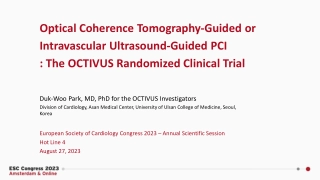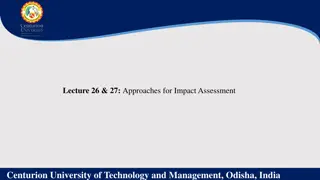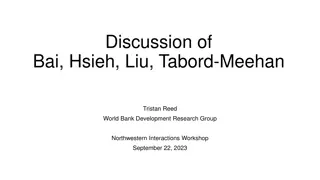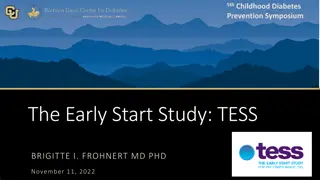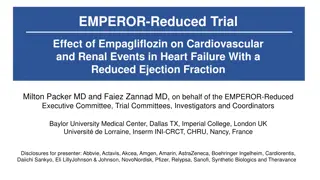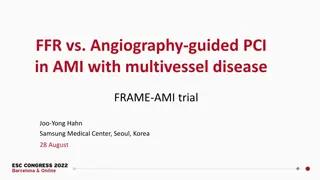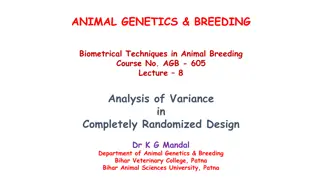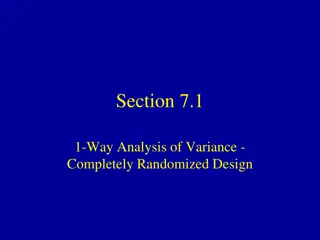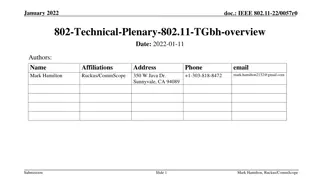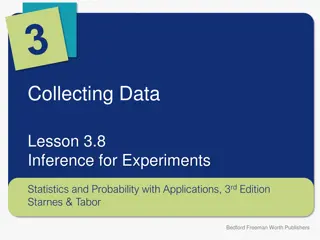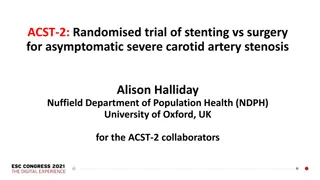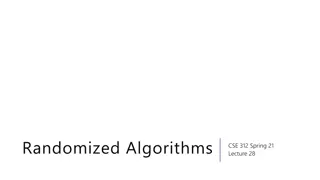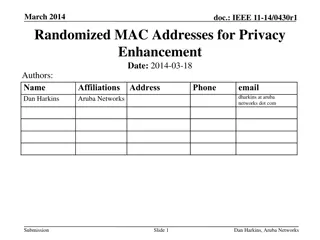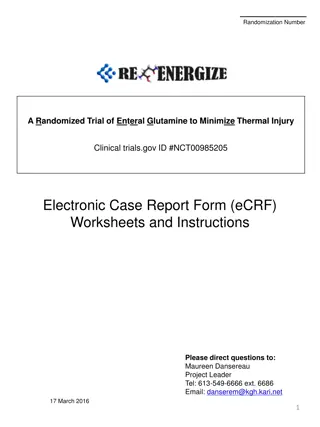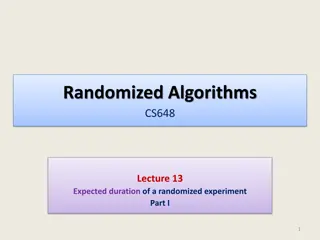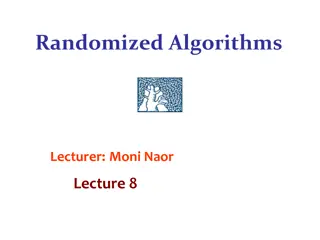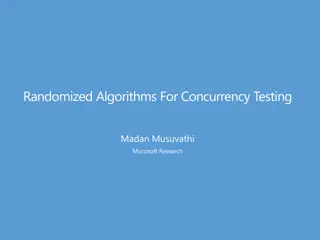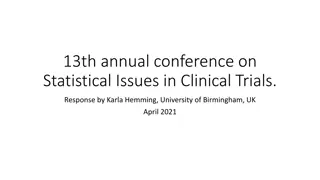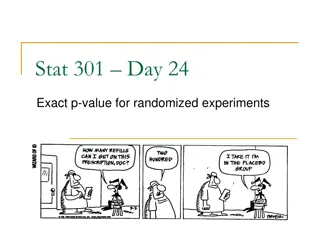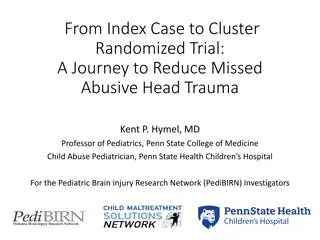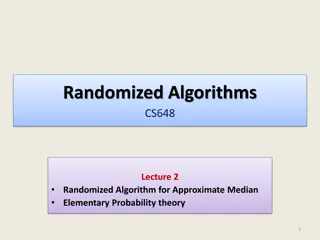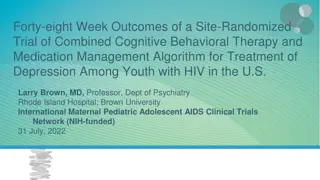Clinical Update
This clinical update presents the 2023 ACC/AHA/ACCP/HRS guideline for diagnosing and managing atrial fibrillation. It categorizes recommendations based on class of recommendation and level of evidence, ranging from strong to weak. Recommendations are supported by high-quality evidence from randomize
1 views • 46 slides
OCTIVUS Randomized Clinical Trial: OCT-Guided vs IVUS-Guided PCI
The OCTIVUS Randomized Clinical Trial compared the clinical efficacy and safety of Optical Coherence Tomography (OCT)-guided and Intravascular Ultrasound (IVUS)-guided strategies in patients undergoing PCI for significant CAD. The study aimed to determine if OCT-guided PCI is noninferior to IVUS-gui
8 views • 27 slides
Spider Feasibility: A Structured Approach to Quality Improvement
Polypharmacy among seniors is a prevalent issue with potentially harmful consequences. The SPIDER approach, focusing on medication appropriateness through evidence-based quality improvement initiatives, aims to address this challenge. Utilizing a structured process informed by data, evidence, and re
1 views • 15 slides
Efficacy and Safety of Ferric Carboxymaltose for Heart Failure with Iron Deficiency
Iron deficiency is prevalent in heart failure patients with reduced ejection fraction and is linked to poor outcomes. The HEART-FID trial investigates the impact of intravenous ferric carboxymaltose (FCM) on all-cause mortality, heart failure hospitalizations, and exercise capacity in chronic HFrEF
1 views • 17 slides
Our Golden City of the Arts (2022) by Cedric Michael Cox - Building Identification Challenge
Explore the captivating artwork "Our Golden City of the Arts" by Cedric Michael Cox, commissioned for ArtsWave 100. Identify the 22 organizations represented in the piece for a chance to win a prize. The painting showcases a vibrant cityscape with various iconic buildings from the arts scene. Challe
1 views • 6 slides
Prevention of Chemotherapy-Related Heart Damage in Breast Cancer and Lymphoma Patients: PROACT Study
Dr. David Austin leads the PROACT study aiming to prevent chemotherapy-related heart damage in breast cancer and lymphoma patients using the ACE inhibitor enalapril. The research focuses on the effectiveness of enalapril in mitigating anthracycline cardiotoxicity, crucial for reducing long-term impa
3 views • 19 slides
Pragmatic Urinary Sodium-Based Treatment Algorithm in Acute Heart Failure (PUSH-AHF) Trial Overview
The PUSH-AHF trial, conducted at the University Medical Center Groningen, aimed to evaluate the effectiveness and safety of natriuresis-guided diuretic therapy in acute heart failure. The study design was pragmatic, prospective, single-center, open-label, randomized, and controlled. Key outcomes inc
2 views • 20 slides
SISTER Study: Improving Stroke Treatment Response with TS23
SISTER Study led by Eva Mistry aims to identify a safe and effective dose of TS23 for treating ischemic stroke patients with core-penumbra mismatch. The Phase-2 trial involves 300 adults and spans 54 months, with primary endpoints focusing on treatment efficacy and safety. The study is randomized, p
0 views • 22 slides
Double-blind, Randomized Trial of Interatrial Shunt in HF Patients
This study details the principal results of the RELIEVE-HF trial, investigating the safety and effectiveness of the V-Wave Ventura interatrial shunt device in patients with heart failure with reduced and preserved ejection fraction. Key inclusion and exclusion criteria are outlined, emphasizing the
0 views • 30 slides
Approaches for Impact Assessment at Centurion University, India
Various approaches for impact assessment include Experimental Design, Quasi-Experimental Design, Before-After Comparison, Counterfactual Analysis, Cost-Benefit Analysis, Qualitative Methods, and Mixed Methods. These methods help evaluate the effectiveness and efficiency of interventions by measuring
0 views • 4 slides
Discussion of Randomized Experiments and Experimental Design Challenges
Randomized experiments face statistical power challenges due to rare outcomes and high variance. Stratifying randomization can help control for correlated residual variance based on baseline values of outcomes. Implications for applied economists include addressing attrition and treatment effect het
0 views • 6 slides
POSNOC & ATNEC Trials Update by Amit Goyal: Investigating Axillary Treatment in Breast Cancer
POSNOC (Positive Sentinel Node) and ATNEC trials are investigating the effectiveness of axillary treatment in women with early-stage breast cancer having metastases in one or two sentinel nodes. Led by Chief Investigator Amit Goyal in the UK, this randomized controlled trial compares adjuvant therap
1 views • 21 slides
5th Childhood Diabetes Prevention Symposium: The Early Start Study by Dr. Tess Brigitte I. Frohnert
The 5th Childhood Diabetes Prevention Symposium discusses the Trial of Early Initiation of CGM-Guided Insulin Therapy in Stage 2 T1D, focusing on the background, goals, and protocol of the study. The symposium aims to minimize dysglycemia, avoid adverse outcomes, and optimize education through early
0 views • 31 slides
Empagliflozin Effects on Heart Failure with Reduced Ejection Fraction: EMPEROR-Reduced Trial Overview
Empagliflozin's impact on cardiovascular and renal events in heart failure with reduced ejection fraction was assessed in the EMPEROR-Reduced trial led by Milton Packer, MD, and Faiez Zannad, MD. The trial, enriched for patients with severe left ventricular dysfunction, randomized participants to em
2 views • 22 slides
Comparison of FFR-guided PCI vs Angiography-guided PCI in AMI with Multivessel Disease: FRAME-AMI Trial
In patients with acute myocardial infarction (AMI) and multivessel coronary artery disease, this study aims to compare fractional flow reserve (FFR)-guided PCI with angiography-guided PCI for non-infarct-related artery lesions. The hypothesis is that selective PCI guided by FFR is superior to routin
2 views • 23 slides
Biometrical Techniques in Animal Breeding: Analysis of Variance in Completely Randomized Design
Biometrical techniques in animal breeding involve the use of analysis of variance (ANOVA) to partition total variance into different components attributable to various factors. In completely randomized designs, experimental units are randomly assigned to treatments, ensuring homogeneity. The total n
0 views • 34 slides
Analysis of Variance in Completely Randomized Design
This content covers the analysis of variance in a completely randomized design, focusing on comparing more than two groups with numeric responses. It explains the statistical methods used to compare groups in controlled experiments and observational studies. The content includes information on 1-way
0 views • 48 slides
IEEE 802.11bh Overview: RCM and TGbh Activities
Overview of IEEE 802.11 Task Group bh (TGbh) activities related to Randomized and Changing MAC addresses (RCM) for user privacy protection. The document discusses the purpose of RCM in concealing device identities, potential impact on network recognition and user experience, and the evolution of IEE
0 views • 9 slides
Understanding Randomized Hill Climbing Algorithm for Challenging Problem Solving
Randomized Hill Climbing is a versatile approach to solving complex problems by sampling points in the neighborhood of the current best solution. This method is easy to apply, resource-efficient, and usually fast. However, defining the neighborhood and choosing appropriate parameters can pose challe
4 views • 14 slides
Understanding Inference for Experiments in Statistics
Learn about inference for experiments in statistics, including completely randomized design, statistical significance, and random assignment to treatments. Discover how to analyze results, determine significance, and interpret differences in responses. Explore the concept through practical applicati
1 views • 10 slides
Understanding Clinical Trials: Types and Designs
Clinical trials are essential research studies that evaluate new tests and treatments to improve human health outcomes. They involve various phases, designs, and purposes, such as treatment trials, prevention trials, and observational studies. Different types of clinical trial designs include experi
7 views • 18 slides
Sharding and Scaling in Blockchain: Overcoming Limitations for Improved Performance
Sharding and scaling play a crucial role in enhancing the performance of blockchain networks. This lecture explores how sharding helps distribute the workload efficiently, enabling better storage, computing, and communication scalability. The concept of randomized node allocations and adaptive adver
0 views • 10 slides
ACST-2 Trial: Stenting vs. Surgery for Carotid Artery Stenosis
ACST-2 is a randomized trial comparing carotid artery stenting (CAS) versus carotid artery surgery (CEA) in asymptomatic patients with severe carotid stenosis. The trial, published in The Lancet in August 2021, involved 3625 patients. While surgery has been shown to reduce stroke rates, modern medic
0 views • 19 slides
Low-Dose Tricyclic Antidepressants (TCA) for IBS: ATLANTIS Study Overview
The ATLANTIS study evaluated the efficacy of low-dose amitriptyline (10-30 mg) in improving Irritable Bowel Syndrome (IBS) symptoms compared to placebo in a 6-month randomized controlled trial in a primary care setting. This important research aims to address the lack of definitive treatment guideli
0 views • 12 slides
Understanding Randomized Algorithms: Types and Examples
Explore the world of randomized algorithms through types like Las Vegas and Monte Carlo, with a focus on classic examples such as Quick Sort. Learn how randomness plays a crucial role in computation and discover the principles behind these algorithms. Dive into the applications of randomized algorit
0 views • 22 slides
Understanding Randomized Algorithms: A Deep Dive into Las Vegas and Monte Carlo Algorithms
Randomized algorithms incorporate randomness into computations, with Las Vegas algorithms always providing the correct answer but varying in time, while Monte Carlo algorithms occasionally give wrong answers. Quick Sort is a classic Las Vegas algorithm that involves pivoting elements for sorting. Ch
4 views • 21 slides
Overview of Mutual Exclusion and Memory Models in Distributed Systems
Discussion on fast, randomized mutual exclusion techniques by George Giakkoupis and Philipp Woelfel. Exploring asynchronous shared memory systems with atomic operations. Understanding mutual exclusion principles as outlined by Dijkstra in 1965 and measuring time efficiency in critical sections. Delv
2 views • 23 slides
Enhancing Privacy with Randomized MAC Addresses in 802.11 Networks
This presentation discusses the use of randomized MAC addresses as a privacy-enhancing measure in 802.11 networks. Passive observation of MAC addresses poses privacy risks, and the proposal suggests assigning random MAC addresses to portable devices to mitigate tracking risks. By periodically changi
0 views • 10 slides
Electronic Case Report Form (eCRF) for Randomized Trial of Enteral Glutamine to Minimize Thermal Injury
Development of case report form worksheets for data collection in a randomized trial focusing on enteral glutamine use to minimize thermal injury. The document provides detailed instructions for research coordinators on data recording from medical charts to be entered into the electronic data captur
1 views • 61 slides
Expected Duration of a Randomized Experiment: Coupon Collector Problem Analysis
Explore the fascinating Coupon Collector Problem, where distinct coupons are randomly selected from a bag until each has appeared at least once. Dive into the analysis of the expected number of iterations required for all coupons to be collected, shedding light on the gradual transition through disc
0 views • 33 slides
Advanced Encoding Techniques in Randomized Algorithms
Explore innovative approaches in randomized algorithms through techniques such as perfect memory, efficient card guessing strategies, and polynomial encoding methods over finite fields. Learn how to optimize memory usage and enhance predictive capabilities in algorithmic processes.
0 views • 41 slides
Understanding Probabilistic Concurrency Testing for Bug Detection
Explore the concept of probabilistic concurrency testing and how randomized scheduling algorithms can help detect bugs efficiently. Learn about bug depth, randomized algorithms, and the development of PCT to improve the effectiveness of stress testing tools like Cuzz.
0 views • 23 slides
Challenges and Solutions in Concurrency Testing with Randomized Algorithms
Concurrency testing in complex cloud services presents challenges such as bugs, performance problems, and data loss. Randomized algorithms, like Probabilistic Concurrency Testing (PCT), offer effective bug-finding solutions. PCT provides probabilistic guarantees and scalable bug detection for distri
0 views • 37 slides
Statistical Issues in Clinical Trials: Insights from 13th Annual Conference
The 13th annual conference on Statistical Issues in Clinical Trials covered topics such as penalties for extra variation and limited degrees of freedom, the Diet-Heart Hypothesis, controlled trials, unit of randomization, and causal inference. Speakers highlighted the importance of addressing cluste
0 views • 10 slides
Exact P-Value for Randomized Experiments and Quiz/HW Feedback
In this Day 24 session of Stat 301, exact p-values for randomized experiments were calculated in Investigation 3.6 Questions (a) - (f). The completion of both Section 1 and Section 2 of this investigation is noted. Additionally, comments on a quiz or homework assignment were provided.
0 views • 16 slides
A Journey to Reduce Missed Abusive Head Trauma: From Index Case to Cluster Randomized Trial
Abusive head trauma (AHT) is a significant cause of trauma-related death and disability in young children. The journey to address missed cases of AHT began with the index case in 1995, leading to a cluster randomized trial aiming to improve recognition and prevention. The consequences of missed AHT
0 views • 74 slides
Randomized Algorithms for Approximate Median with Elementary Probability
This content covers a lecture on a randomized algorithm for finding an approximate median element using elementary probability theory. It discusses the importance of insight and basic probability in designing and analyzing such algorithms. The lecture presents a simple probability exercise involving
0 views • 25 slides
Forty-eight-Week Outcomes of a Site-Randomized Trial for Depression Among Youth with HIV
This study explores the outcomes of a site-randomized trial utilizing a combined cognitive behavioral therapy and medication management algorithm for treating depression among youth with HIV in the U.S. The team involved includes medical officers, data managers, statisticians, clinical trial special
0 views • 22 slides
Methods for Quantifying Efficacy-Effectiveness Gap in Randomized Controlled Trials
This research discusses the quantification of the efficacy-effectiveness gap in randomized controlled trials (RCTs), particularly focusing on examples in Acute Respiratory Distress Syndrome (ARDS). It explores the challenges of RCTs, ethical considerations, and the use of observational data for caus
0 views • 8 slides
Efficient Implementation of Atomic Snapshots with Randomized Assistance
Explore the innovative approach of implementing atomic snapshots in O(log n) steps using randomized assistance, as discussed by James Aspnes, Yale Keren Censor-Hillel, and Technion researchers. The method involves snapshot objects, multi-writer registers, and tree structures to achieve efficient ope
0 views • 18 slides

